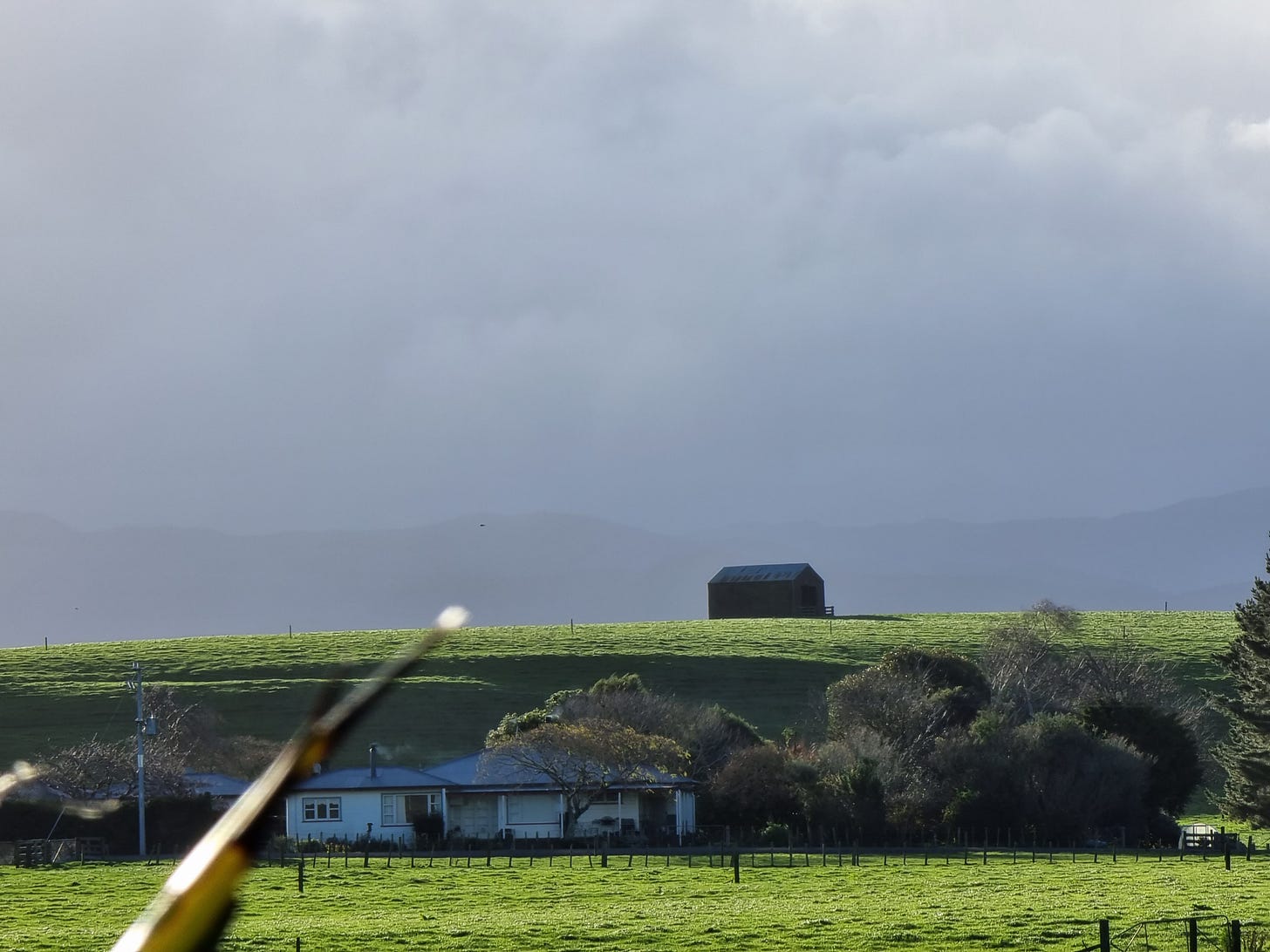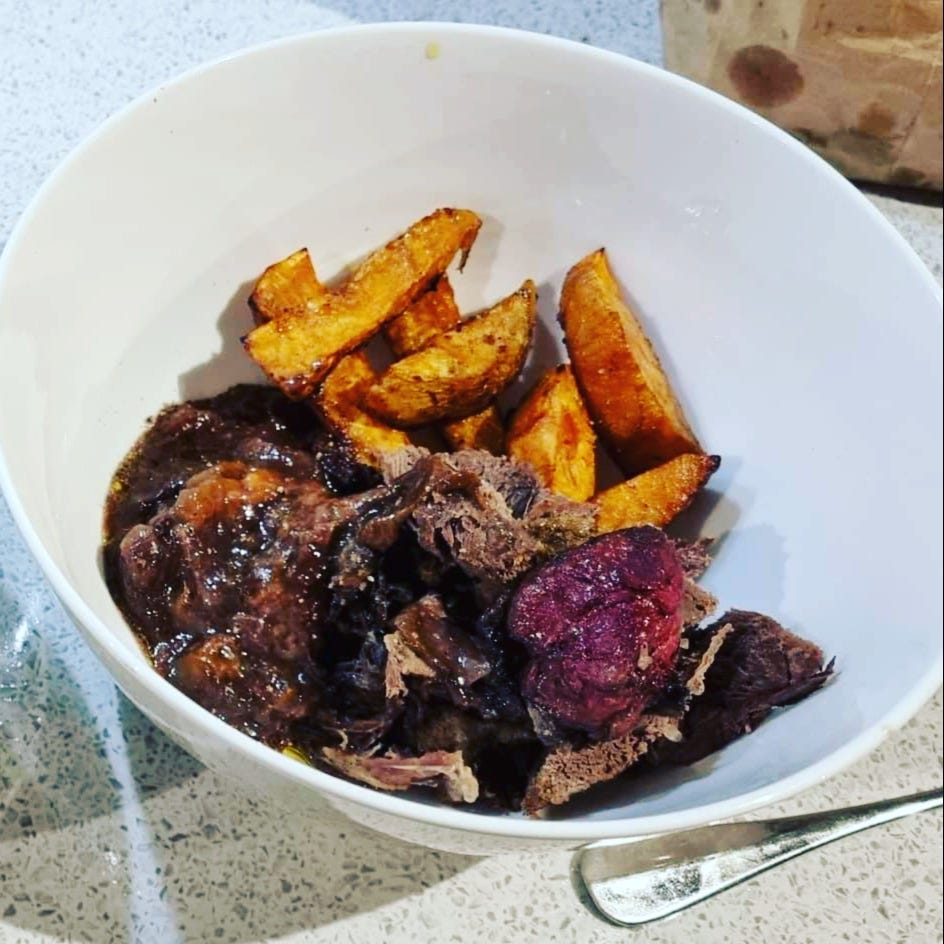This week’s brutal weather has led to a lot of office and kitchen time. K has been having a bit of downtime due to the weather but still has to feed out and manage stock in some hideous outdoor conditions. The wet weather gear has been getting a workout, and the pigs are hiding in the stable, refusing to come out in the weather.
Because humans have boiled the sea now, and New Zealand is in the middle of a marine heatwave, a big blast of cold air from the antarctic (not unusual for this time of year) is turning into a monstrous train of thunderstorms that has been running for several days with more to come.
That cold air hits the Tasman Sea, the fastest-warming on earth, and it’s all on. Thunderheads grow and head off across the coast, pop over the Tararua mountains, and roar through the valley with a salvo of thunder and lightning every few seconds.
Two of our lakes have reappeared in the paddocks with all the water, nothing unusual for this time of year, but a pain to work and move around in.
Before I get into this week’s country recipe, I wanted to say thanks for your feedback on future articles; it’s been constructive, especially from you, Mr B, giving me a stroke of genius idea I am working on.
Those of you who know me know I love to cook and eat. I love experimenting with food. I love experimenting on our friends with food. This can lead to some culinary disasters but great nights.
You’ll remember that Sparrow, along with his duck hunting compadres, has given me a lot of duck, something that I haven’t worked with before. So in honour of the hunters, I give you an experimental recipe called Sparrow’s Roast Duck.
Sparrow’s Roast Duck
Wild duck is notoriously easy to stuff up. Unlike farmed duck, it tends to have a lower fat content, and the meat is very lean, which means that if you try and cook it like a chook, you’re going to end up with something quite close to the consistency of a rugby ball.
This is country-style cooking and lacks the finesse and drama of a professional recipe, and the method sticks very close to my style of making stuff up and seeing if it tastes ok.
What you’ll need:
A wild duck. Bloody obvious, I would have thought, but just in case you’re a bit simple. This recipe feeds a couple of people, given duck isn’t that large. I am sure you can substitute it for a farmed duck.
Plums. You want the larger Doris type variety. I use them from our tree, free freezing them when they are in season for later use. They seem to freeze fine. You could probably use canned plums or oranges, which are in season. Canned plums might be a bit sweet.
An onion.
Potatoes.
Salt and pepper.
Raw sugar, if your plums are a bit tart, I leave the skins on them to give them that sweet and sour taste, and you’ll need to play about a bit to get it right.
Method:
No one should be cooking without a) having a drink in your hand and b) because you are drinking and playing with fire a nearby fire extinguisher. If you set fire to the kitchen for some reason, you’re good to sort it out.
This is probably a six-drink cooking time, with some periods where you can drink your tipple and contemplate why people in cities hate farmers so much when all you do is feed them.
You’ll need a cruset, er, crusau, crocket, or whatever it’s bloody called. It’s one of those oven dishes with a ceramic inside, iron, and a tight-fitting lid. You could use an oven bag, but it can get as messy as buggery or just a standard roasting dish with a lid. Mind you, an oven bag will get messy, so you still need a dish.
You’ll notice there are very few ingredients. I hate recipes that have a great long list of ingredients that you are guaranteed to stuff up. You want to bring the gamey duck taste through, offset it with the plums, and have fatty roast potatoes to suck it all up.
A tiny bit of oil goes in the roasting dish, and you must brown off the duck very quickly. Don’t screw this up. There is not always a lot of meat on the flying dinner, and you don’t want to cook it, just seal it.
Take Mr Quack and set him aside; you’ll have a bit of fat and oil left. Into that, dump your chopped-up onion and give it a quick seeing too. Then, add in your plums with a reasonable amount of juice. Give them a warming through so your sauce is ready to go.
Add salt, pepper, and sugar (if you need it) to taste. And taste it, but don’t burn your tongue; that’s just amateur cooking.
Stuff your delicious pond dweller with several plums; you don’t need anything else, just plums. It’ll keep some moisture inside the beast, and they are delicious at the end.
Grab your de-feathered friend and place it breast down in the pan. The sauce won’t cover the whole of Mr Quack, which is fine. Well, I think it’s ok; a french chef would probably try and stab me for suggesting this method.
Grab the lid and fit it tightly; Donald will be more steamed than roasted, so you don’t want the liquid escaping; otherwise, you have a disaster on your hands. Throw it in an oven at around 140C. Set your timer; you’re drinking, so you need a timer, for god’s sake, and then get online and buy the following book while you are waiting for the next stage.
While Mr Quack is in his plum-infused sauna, I want to have a quick chat about treating your meat correctly.
Too many people rush off the supermarket, buy meat, take it home, throw some seasoning on it and cook it there and then. This is bad form, and it’s a waste of meat. Red meat needs to age and, if you are seasoning it, must sit for a long time.
Some recipes I use call for a week of ageing in the fridge after seasoning and then anywhere up to another week marinating in whatever delicious marinade you have concocted before being cooked. Never cook meat cold, always at room temperature. Seasoning a roast lamb two or three days before you cook it versus at the time produces an entirely different dish.
Lesson over. Let’s see how Donald is doing.
Pull the bird out of the oven and give it a couple of pokes to see if it’s bleeding. Frankly, you can eat duck a bit rare, it’s not like poultry, and the meat is more red than white. Have a play and see what you think. If you reckon it’s about ready, get it out and rest it.
If you want it done better, or it’s just bloody, pop it back in for another hour but at a lower heat, maybe 120C. This is the experimenting bit. I like the duck to fall off the bone as much as possible.
Side note: You could do this recipe in a crock pot and slow cook it if you want to play safe.
Regardless, you’ll have your duck out wrapped and resting at some point.
If you are lucky, you’ll have some duck fat in the bottom of your roasting dish with the plums and onion. Get as much of that out as you can. The method for this is using a spoon, getting some of the gravy by accident, and shouting and swearing a bit.
By now, the clever amongst you will realise I forgot to tell you what to do with the potatoes, but thank god you are smart enough to have read the entire recipe before just starting. Chop your potatoes into bite-size pieces (or kumara, but it tends to be soggier) and, if you like, parboil them. It doesn’t matter. Parboiling will make them more fluffy.
Get the over up to 200C or thereabouts. Take some duck fat (refrigerate the rest for another day) and toss the potatoes in a dish with it. Make sure they are well coated in the fat. They go into the oven and check every 15 minutes to ensure they are not sticking and give them a bit of a toss. Once they start to brown off, dial back the heat and they are ready when you can get a fork into them.
While juggling potatoes, take the dish with the plum sauce in it and set it to simmer. You want to reduce this down carefully to get a thicker sauce. Be gentle with the bastard; it will caramelise and burn if you turn your back on it.
Now, I use a couple of deep bowls to serve this magnificent feast. A good layer of the thick sauce in the bottom of the bowls, then a pile of roast potatoes on top, followed by sliced or shredded duck on top again. Take a couple of plums that you stuffed Donald with and add them.
That’s it. If you want to add veggies, then be my guest. I can’t see why; this is pure winter comfort food. Never forget, kale is for cattle, not for people. If you eat kale, a cow is going without in winter; this will cause pugging and Greenpeace turning up to take photos to post on Facebook.
Variations are using a slow cooker (safer) and duck breasts instead of the whole bird. The cooking temperature and time are tricky, and you’ll have to play around a bit.
As you can see, I won’t be writing a cookbook anytime soon. I don’t have the discipline to write a competent set of instructions, but you can be sure that I will continue to share some of the more creative experiments here.
We’re continuing the food theme next time, as there is a new American BBQ option opening in the valley, and K and I have been crash test dummies on their new menu.
Until then, stay warm, experiment with food, and let me know what you think.








